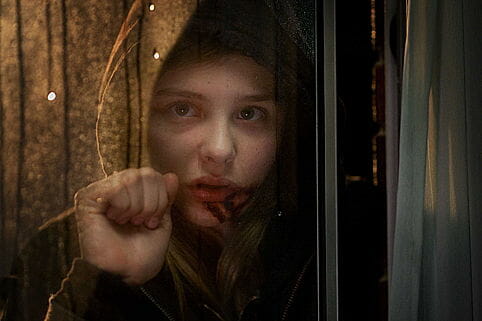By Peter Wertz · October 4, 2010

Let's get it out of the way. An American remake of 2008's internationally successful Swedish film Let the Right One In was a bizarre choice and blatantly shallow. I suppose one could take the stance that the motivation for an Americanized version is based on the quantity of character and story, and not just that the film is marketable and vampires are hot right now. Nonetheless, in the words of the original's own director, "If one should remake a film, it's because the original is bad, and I don't think mine is." So then, a viewing of Matthew Reeves' less than scrupulous Let Me In can either be dismissed from square one, or it can be viewed and judged despite its bastardization. I, thankfully, chose to do the latter.
Whether watching the Swedish or American version, the story is essentially the same. A young boy, Owen (Kodi Smit-McPhee), whose life is mostly spent alone or in fear, finds a rare friend in Abby (Chloe Moretz). Abby as it turns out is a vampire, and her perpetual youth keeps her from any sort of independence. Her and her guardian (Richard Jenkins) live a tremulous lifestyle of murdering for survival and moving on when they've worn out their welcome. As Owen and Abby grow closer, the nature of her reality forces him into a premature adulthood and sets the two of them on a course away from the cold winter of youth.
Even past the story, the film's aren't terribly divergent. At least not enough to bother with here. Let the Right One In is a beautifully constructed and original film with great performances and the timeless quality so many directors hope for. But, this is not a comparison of an original film and it's remake. This is an analysis of Matthew Reeves' American made Let Me In, and I will subsequently do my best to keep it that way. Starting with the performances of his two child actors, both of whom had made names for themselves prior to this film. Kodi Smit-McPhee broke out with 2009's The Road, and Chloe Moretz was huge on the screen with this past summer's Kick-Ass. While I didn't see The Road I was supremely impressed with Kick-Ass' Hit-Girl and excited to see a subdued Moretz in a much darker role. In the end though it was Smit-McPhee's Owen who really shined through. Owen's life is a miserable winter of neglect and ruthless persecution and Smit-McPhee is beautifully tragic in the role. Certainly he has the look of a child perpetually tormented by all manner of things, but his performance reinforces so strongly his misery. Meanwhile the school bully's obsession with Owen is as dark as any antagonist's and it is a sheer impossibility not to empathize. It's this empathy that drives Let Me In and underlies its starkest moments. Once the subtextual connection between Abby's degraded guardian and Owen has been fully entrenched, we see Owen's future not as a possible escape, but as a further, if slightly less lonesome detention. Owen is plainly not a happy character.
As for the timbre, Let Me In is perfectly somber, capturing a New Mexico winter with a palette consisting mostly of blacks and grays. Cold can either be visual, or visceral or most effectively (and as is the case with Reeves' latest), both. Winter exists very coldly in the theater of a Let Me In viewing. A number of things contribute. Abby's undeadedness finds her walking around in the snow mostly shoeless and in shorts, and Owen often stands in his darkened room shirtless, a window away from winter. Stronger and bleaker than these visual cues though is the feeling that every character is alone and unprotected. Abby's guardian is a specter, perhaps once providing an emotional connection, now simply resigned and trodden. Apart from the warmth he fails to provide her, he too is quite vulnerable, and his story is perhaps the saddest we see. As for Owen, his parents are in the process of divorcing and remain essentially nonexistent. Though he lives with his mother, she is faceless and enfolded in the ghostly arms of her God. Here, human connection is on the verge of extinction.
This, I think, is the key to Let Me In's emotional resonance, this gap between bodies. The tumultuous circumstances of Abby and Owen's friendship are never not present, yet they seem inevitably on a path to partnership. Even once we recognize the depressing reality of Owen's fate should he join Abby, we still are forced to hope for it. The alternative is simply too sad. It's Owen's hazy recognition of this that brings him plummeting into adulthood. His choice to go with Abby, to play the role of her perpetual guardian is a weighty one. It's a lifetime commitment and Owen knows this. Still, while he may have a strong handle on the situation, he lacks the constitution to resist. His detriment is his lonesomeness, and this too is his tragedy. And for those who may see Owen's emancipation and exodus as a good thing, as a bright horizon, just remember the fate of Abby's guardian and remember how long a vampire lives.
And so, this film is allowed its own, independent existence from its forebear. Though perhaps not deserved, it is certainly earned. Let Me In is a truly beautiful and tragic piece of film. It bleeds hope like any of its protagonist's doomed victims, and remains in one's head like a virus. Walking out of the theater I couldn't remember the last film that had made me feel so miserable, so wrecked, so sad. This may not be the most enticing advocacy, but then again, some of the best films ever made have also been the most despairing. As summer comes to a close, we're reminded that joy is not the only universal notion.
4 out of 4 remake successes.